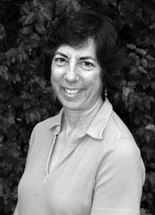SSA Centennial Celebration
Profiles of Distinction Series
Judith Branman Caldwell, A.M. 1976
Senior Licensed Clinical Social Worker, Supervisor and Teacher,
West Los Angeles VA Medical Center; Co-creator, Co-designer, Developer
and Instructor of Educational Modules for Graduate Social Work Students.
"I’m creative. I’m thinking. I’m doing exactly what I want to be doing," extols Judith Branman Caldwell on her groundbreaking work as a senior social worker at the West Los Angeles Veterans Administration Medical Center. "And, I could not be where I am now if not for SSA, where my journey started."
For the past 20 years, from field placement sessions for graduate social work interns from USC, UCLA, and California State University at Long Beach, she has taught theoretical information on clinical social work activities and skills through the creation of several educational modules. One module is an 8-hour course on clinical case management. The other is a 16-week course on the DSM IV-TR, highlighting assessment, diagnosis, and treatment planning.
Ms. Caldwell is also challenging the traditional social work apprenticeship model by pioneering complex, nonlinear concepts in "a paradigm shift from the traditional linear world to a non-linear model of learning," as she states in her original interpretation of "The 'L’ Paradigm or Complex Learning Paradigm." This program includes an application of complexity theory into a new educational paradigm, and the application of the learning paradigm to an active, real world simulation, called the Pilot Projects. Ms. Caldwell believes that these new and exciting educational formulations and practices are critical in today’s complex world.
"This is a break from the traditional teachings and takes into consideration that continuous change is a constant, and students in today’s world must be able to work with that concept. It is the interpretation and application of complexity theory, complex adaptive systems, and aspects of quantum mechanics to field education models," says Ms. Caldwell. Her many presentations, both nationally and internationally, on the new complexities of social work field education in today’s digital age have garnered high praise. "Having this exchange with and among students will be important in their future practices and eventually add new meaning to their treatment planning, interviewing skills, role playing, and so much more."
Ms. Caldwell remembers wanting to become a social worker early in her life when the emotional impact of an accident, and the resulting hospital stay, brought her into contact with a social worker. After receiving a bachelor’s degree in sociology in 1973, she looked for a graduate program in social work, and SSA stood out. "I applied and was accepted, and from the onset it was a thrill to be there because the atmosphere was so positive. Some of my wonderful professors from that time who made lasting impressions included Laura Epstein (Laura Epstein, A.M.), Helen Harris Perlman (Helen Harris Perlman, Ph.D.), Inger Davis (Inger Davis, Ph.D.), and Judy Mishne (Judith M. Mishne, Ph.D). They made me think about how people deal with whatever circumstances they find themselves in, and how it is better to view the whole picture, before dissecting its many parts," she recalls.
Ms. Caldwell wears many hats in her busy schedule. At the VA, she has risen to senior social worker, where her role includes clinical case management, individual, group, and marital therapy in such specialized areas as substance abuse, trauma, and affective and thought disorders in the outpatient mental health clinic, where she also directs one of the Pilot Projects for graduate students.
In addition, since 2003 she has provided individual weekly clinical supervision for associate clinical social workers.
As a clinician in the West Los Angeles VA Medical Center, she is a member of the clinical assessment team with responsibilities in comprehensive psychiatric assessment, cognitive-behavioral treatment, family treatment, trauma work, and all major mental illnesses in the treatment population including affective, psychotic, and anxiety disorders. As a creator of new social work educational modules, she helped bring the field into the 21st century. As a teacher and facilitator of groups of students, she guides their training by opening up the theoretical underpinnings and various processes of clinical treatment. As a supervisor, she brings expertise and enthusiasm to the next generation of social workers. And as a presenter of important papers, both here and abroad, she shares new theories that have professionals in social work education taking notice.
"It has been a wonderful experience to continue the journey I started at SSA and to find new avenues, and test new concepts in such important areas as distinguishing information from knowledge, empowerment, and ownership, giving and making choices, and looking at the same situations differently. I consider this a journey, and not work," says Caldwell. "I want to continue to give back to the profession that has meant so much to me. This means expanding these new concepts, testing new theories, and discovering that looking at issues in their entirety instead of piece by piece is the essence of social work. This is the journey that SSA put me on, and I am forever grateful."
